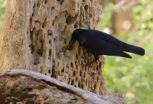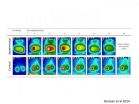Newly discovered gut virus lives in half the world's population
Biologists at SDSU have found a previously unknown virus that is extremely widespread and could play a major role in obesity and diabetes
2014-07-24
(Press-News.org) Odds are, there’s a virus living inside your gut that has gone undetected by scientists for decades. A new study led by researchers at San Diego State University has found that more than half the world’s population is host to a newly described virus, named crAssphage, which infects one of the most common types of gut bacteria, Bacteroidetes. This phylum of bacteria is thought to be connected with obesity, diabetes and other gut-related diseases. The research appears today in Nature Communications.
Robert A. Edwards, a bioinformatics professor at SDSU, and his colleagues stumbled upon the discovery quite by accident. Working with visiting researcher and corresponding author on the study Bas E. Dutilh, now at Radboud University Medical Center in The Netherlands, the researchers were using results from previous studies on gut-inhabiting viruses to screen for new viruses.
In the DNA fecal samples from 12 different individuals, they noticed a particular cluster of viral DNA, about 97,000 base pairs long, that the samples all had in common. When Edwards and his colleagues checked this discovery against a comprehensive listing of known viruses, they came up empty.
The researchers then screened for the virus across the database of the National Institute of Health’s Human Microbiome Project (HMP), and Argonne National Laboratory's MG-RAST database, and again found it in abundance in samples derived from human feces.
To prove that the viral DNA they discovered in their computer data actually exists in nature, fellow SDSU virologist John Mokili used a technique known as DNA amplification to locate the virus in the original samples used to build NIH’s database.
“So we have a biological proof that the virus they found with the computer actually exists in the samples,” Mokili said.
This was a new virus that about half the sampled people had in their bodies that nobody knew about.
“It’s not unusual to go looking for a novel virus and find one,” Edwards said. “But it’s very unusual to find one that so many people have in common. The fact that it’s flown under the radar for so long is very strange.”
An ancient virus
The fact that it’s so widespread indicates that it probably isn’t a particularly young virus, either.
“We’ve basically found it in every population we’ve looked at,” Edwards said. “As far as we can tell, it’s as old as humans are.”
He and his team named the virus crAssphage, after the cross-assembly software program used to discover it.
Some of the proteins in crAssphage’s DNA are similar to those found in other well-described viruses. That allowed Edwards’ team to determine that their novel virus is one known as a bacteriophage, which infects and replicates inside bacteria—and using innovative bioinformatic techniques, they predicted that this particular bacteriophage proliferates by infecting a common phylum of gut bacteria known as Bacteriodetes.
Gut punch
Bacteriodetes bacteria live toward the end of the intestinal tract, and they are suspected to play a major role in the link between gut bacteria and obesity. What role crAssphage plays in this process will be a target of future research.
Further details about crAssphage have been difficult to come by. It’s unknown how the virus is transmitted, but the fact that it was not found in very young infants’ fecal samples suggests that it is not passed along maternally, but acquired during childhood. The makeup of the viral DNA suggests that it’s circular in structure. Further laboratory work has confirmed that the viral DNA is a singular entity, but it’s proven difficult to isolate.
“We know it’s there, but we can’t capture it quite yet,” Edwards said.
Once the virus is isolated, he hopes to delve into its role in obesity. It’s possible the virus in some way mediates the activity of Bacteriodetes colonies, but whether crAssphage promotes or suppresses obesity-related processes in the gut remains to be seen.
The virus might also be used to prevent or mitigate other diseases affected by the gut such as diabetes and gastroenterological maladies.
Once these processes are better understood, Edwards envisions one day the possibility of personalized medicine based on this virus.
“This could be a key to personalized phage medicine,” he said. “In individuals, we could isolate your particular strain of the virus, manipulate it to target harmful bacteria, then give it back to you.”
INFORMATION:
Key Collaborators
In addition to Edwards, SDSU researchers Katelyn McNair, Savannah Sanchez, Genivaldo G.Z. Silva, Lance Boling, Jeremy J. Barr, Victor Seguritan, Ben Felts, and Elizabeth A. Dinsdale worked on the project, in collaboration with Argonne National Laboratory in Illinois. The study’s corresponding author, Bas E. Dutilh, shares an affiliation with SDSU, Radboud University Medical Center in The Netherlands, and the Federal University of Rio de Janeiro in Brazil. Contributing researcher Ramy K. Aziz shares an affiliation with SDSU and Cairo University in Egypt. Contributing researcher Noriko Cassman was at SDSU during the time of the study and now is at the Netherlands Institute of Ecology.
San Diego State University is a leading institution for bacteriophage research. Its Viromics Information Institute, which has been identified as an SDSU Area of Excellence, is led by biology professors Forest Rohwer, Anca Segall, Edwards and Dinsdale, and takes a cross-disciplinary approach to learning more about bacteriophages and exploring their potential for medical usage. END
ELSE PRESS RELEASES FROM THIS DATE:
Using media as a stress reducer can lead to feelings of guilt and failure
2014-07-24
Washington, DC (July 21, 2014) – It seems common practice. After a long day at work, sometimes you just want to turn on the TV or play a video game to relax, decompress. This is supposed to make you feel better. But, a recent study published in the Journal of Communication, by researchers at the Johannes Gutenberg University Mainz, Germany, and VU University Amsterdam, found that people who had high stress levels after work and engaged in television viewing or video game play didn't feel relaxed or recovered, but had high levels of guilt and feelings of failure.
Leonard ...
Stronger early reading skills predict higher intelligence later
2014-07-24
A new study of identical twins has found that early reading skill might positively affect later intellectual abilities. The study, in the journal Child Development, was conducted by researchers at the University of Edinburgh and King's College London.
"Since reading is an ability that can be improved, our findings have implications for reading instruction," according to Stuart J. Ritchie, research fellow in psychology at the University of Edinburgh, who led the study. "Early remediation of reading problems might aid not only the growth of literacy, but also more general ...
Community service programs that include reflection found to be more beneficial to youth
2014-07-24
Adolescents in some countries and U.S. states are required to perform community service, and many national and nongovernmental agencies promote such service. A new study has found that while community service has broad benefits for adolescents, it is particularly effective when the activities are accompanied by reflection and discussion.
The study, by researchers at Utrecht University and Rutgers University, appears in the journal Child Development.
Researchers used meta-analysis to assess findings from 49 studies from around the world that were conducted from 1980 ...
Stress tied to change in children's gene expression related to emotion regulation, physical health
2014-07-24
Children who have been abused or neglected early in life are at risk for developing both emotional and physical health problems. In a new study, scientists have found that maltreatment affects the way genes are activated, which has implications for children's long-term development. Previous studies focused on how a particular child's individual characteristics and genetics interacted with that child's experiences in an effort to understand how health problems emerge. In the new study, researchers were able to measure the degree to which genes were turned "on" or "off" through ...
Study links autistic behaviors to enzyme
2014-07-23
RIVERSIDE, Calif. — Fragile X syndrome (FXS) is a genetic disorder that causes obsessive-compulsive and repetitive behaviors, and other behaviors on the autistic spectrum, as well as cognitive deficits. It is the most common inherited cause of mental impairment and the most common cause of autism.
Now biomedical scientists at the University of California, Riverside have published a study that sheds light on the cause of autistic behaviors in FXS. Appearing online today (July 23) in the Journal of Neuroscience, and highlighted also on the cover in this week's print issue ...
New York law offers nurses more recognition, responsibility
2014-07-23
(NEW YORK, NY, July 24, 2014) – If past experience is anything to go by, nurse practitioners in New York State are about to get a lot more recognition for their contributions to primary care. In Massachusetts, laws already on the books allowing NPs to provide primary care offer nurses more recognition of their contributions to patient care and better relationships with physicians and administrators, compared with colleagues in New York, according to a study from Columbia University School of Nursing, published in Health Care Management Review.
"This suggests that the ...
Smarter than a first-grader?
2014-07-23
In Aesop's fable about the crow and the pitcher, a thirsty bird happens upon a vessel of water, but when he tries to drink from it, he finds the water level out of his reach. Not strong enough to knock over the pitcher, the bird drops pebbles into it — one at a time — until the water level rises enough for him to drink his fill.
Highlighting the value of ingenuity, the fable demonstrates that cognitive ability can often be more effective than brute force. It also characterizes crows as pretty resourceful problem solvers. New research conducted by UC Santa Barbara's Corina ...
How honey bees stay cool
2014-07-23
MEDFORD/SOMERVILLE, Mass. – Honey bees, especially the young, are highly sensitive to temperature and to protect developing bees, adults work together to maintain temperatures within a narrow range. Recently published research led by Philip T. Starks, a biologist at Tufts University's School of Arts and Sciences, is the first to show that worker bees dissipate excess heat within a hive in process similar to how humans and other mammals cool themselves through their blood vessels and skin.
"This study shows how workers effectively dissipate the heat absorbed via heat-shielding, ...
Hormones after breast cancer: Not fuel for the fire after all?
2014-07-23
A new study supports a growing body of research suggesting a safe and effective role for natural steroid hormones in treating postmenopausal breast cancer, with fewer detrimental side effects and improved health profile than with standard anti-hormone therapies. The study will be published in final format today in the open-access journal Reproductive Biology and Endocrinology.
Breast cancer is the most frequently diagnosed cancer in women in the United States. Approximately 70% of breast cancers are diagnosed in postmenopausal women. Major clinical trials and experimental ...
'Big picture' thinking doesn't always lead people to indulge less, study says
2014-07-23
CHAMPAIGN, Ill. — Buy the latest electronic gizmo du jour, or use that money to fix a leaky roof? Go out with friends, or stay home to catch-up on work to meet that looming deadline? And after you've finished that big project, do you treat yourself to a slice of chocolate cake or settle for a piece of fruit?
These are the kind of self-control dilemmas that people face all the time. And according to research from a University of Illinois expert in new product development and marketing, self-focus plays an important role in how consumers make decisions.
When prompted ...
LAST 30 PRESS RELEASES:
The Lancet: New weight loss pill leads to greater blood sugar control and weight loss for people with diabetes than current oral GLP-1, phase 3 trial finds
Pediatric investigation study highlights two-way association between teen fitness and confidence
Researchers develop cognitive tool kit enabling early Alzheimer's detection in Mandarin Chinese
New book captures hidden toll of immigration enforcement on families
New record: Laser cuts bone deeper than before
Heart attack deaths rose between 2011 and 2022 among adults younger than age 55
Will melting glaciers slow climate change? A prevailing theory is on shaky ground
New treatment may dramatically improve survival for those with deadly brain cancer
Here we grow: chondrocytes’ behavior reveals novel targets for bone growth disorders
Leaping puddles create new rules for water physics
Scientists identify key protein that stops malaria parasite growth
Wildfire smoke linked to rise in violent assaults, new 11-year study finds
New technology could use sunlight to break down ‘forever chemicals’
Green hydrogen without forever chemicals and iridium
Billion-DKK grant for research in green transformation of the built environment
For solar power to truly provide affordable energy access, we need to deploy it better
Middle-aged men are most vulnerable to faster aging due to ‘forever chemicals’
Starving cancer: Nutrient deprivation effects on synovial sarcoma
Speaking from the heart: Study identifies key concerns of parenting with an early-onset cardiovascular condition
From the Late Bronze Age to today - Old Irish Goat carries 3,000 years of Irish history
Emerging class of antibiotics to tackle global tuberculosis crisis
Researchers create distortion-resistant energy materials to improve lithium-ion batteries
Scientists create the most detailed molecular map to date of the developing Down syndrome brain
Nutrient uptake gets to the root of roots
Aspirin not a quick fix for preventing bowel cancer
HPV vaccination provides “sustained protection” against cervical cancer
Many post-authorization studies fail to comply with public disclosure rules
GLP-1 drugs combined with healthy lifestyle habits linked with reduced cardiovascular risk among diabetes patients
Solved: New analysis of Apollo Moon samples finally settles debate about lunar magnetic field
University of Birmingham to host national computing center
[Press-News.org] Newly discovered gut virus lives in half the world's populationBiologists at SDSU have found a previously unknown virus that is extremely widespread and could play a major role in obesity and diabetes




